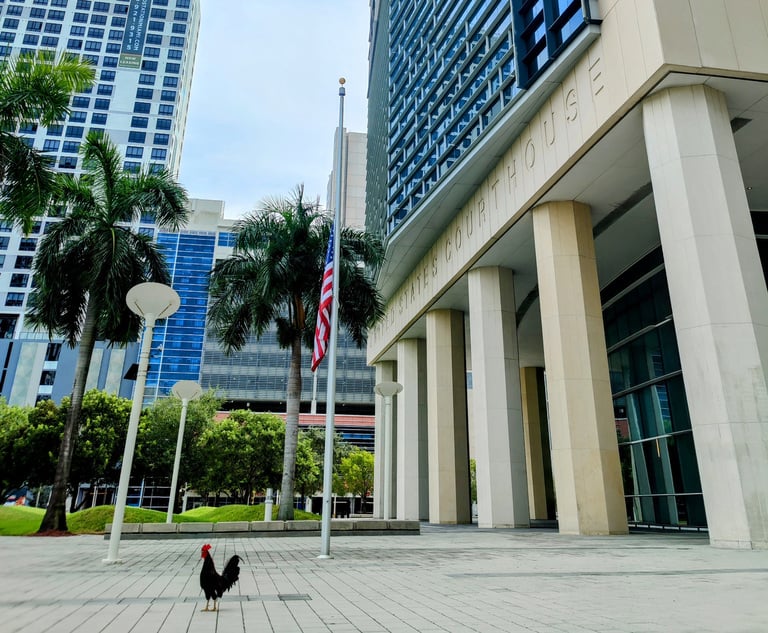 Credit: Aquir/AdobeStock
Credit: Aquir/AdobeStock US, EU Aim to Hit Back at Non-Market Policies With Eye on China
The U.S. and the European Union aim to work together to counter what they call non-market policies, including in China, according to a draft statement ahead of high-level talks due in Washington next month.
November 21, 2022 at 02:30 PM
4 minute read
The U.S. and the European Union aim to work together to counter what they call non-market policies, including in China, according to a draft statement ahead of high-level talks due in Washington next month.
The two sides will pledge to explore which policy tools could tackle the threat posed by such practices, including in the medical devices sector in China, as well as through certain government-controlled investment funds, says the draft, which was obtained by Bloomberg News and is subject to change as discussions on the text continue.
A reference by the EU to some of China's market-impacting policies would represent a win for the U.S. as Washington has been pushing the bloc to take a tougher stand on the issue. European leaders have sought a middle path on China, with French President Emmanuel Macron calling Friday for engagement with Beijing and resisting efforts to divide the world into competing blocs.
U.S. Secretary of State Antony Blinken and U.S. Trade Representative Katherine Tai are scheduled to meet with European Commission Vice Presidents Valdis Dombrovskis and Margrethe Vestager, and commissioner Thierry Breton in the Washington, DC, area on Dec. 5 as part of the consultative U.S.-EU Trade and Technology Council, where the transatlantic partners want to strengthen their bilateral cooperation.
The U.S. and the EU have shared data and examined the market presence of U.S. and EU medical devices companies in China, and are also collaborating on concerns relating to the investment funds, the draft says. The two sides will work together on exploring policy tools to address these challenges, continue to share assessments of the impact of economic and industrial directives, seek to foster supply chain diversification and reduce dependencies, the draft statement says.
Dombrovskis told a conference in Brussels on Monday that trade work with the U.S. in relation to non-market economies is "by now a well-established work stream where we are cooperating." He added that the two sides "share many of the same concerns as regards third-country practices. So obviously there's lots of scope for discussions and for finding common approaches."
Trade Initiatives
The draft statement shows there is also a push for concrete market openings and joint trade initiatives, but these issues are still under discussion.
The current text refers to launching a transatlantic initiative on sustainable trade. The aim would be to support the transition to low carbon economies. This issue is part of a parallel bilateral discussion to address the EU's concerns on a recently passed US tax and climate law, which includes subsidies and tax credits for electric vehicles made in North America.
The law, which was titled the Inflation Reduction Act, has emerged as a point of contention among countries seeking to maintain a tightly united front in the face of Russian military aggression and heightened tensions with China. French Finance Minister Bruno Le Maire warned last week that U.S. efforts to support domestic clean energy initiatives could unfairly damage European industry.
The draft also refers to a previous agreement on a so-called early warning mechanism to address and mitigate semiconductor supply chain disruptions in a cooperative way. The text mentions the possibility of the sides signing an administrative arrangement to implement the mechanism.
Sweeping U.S. export controls on chips, which may soon be extended to other strategic technologies, have fueled European concern about American overreach. In October, President Joe Biden restricted the sale of semiconductors and chip making equipment to China in a bid to stem its economic development, and asked key allies to comply, raising fears of a split in the global economy.
The draft also indicates the U.S. and the EU are looking into:
- Working together to strengthen the resilience of subsea cables.
- Enhancing cooperation on export controls by exchanging information, simplifying trans-Atlantic trade on dual-use items and enhancing collaboration on enforcement.
- Collaborating further on artificial intelligence standards.
- Exploring the feasibility of extending mutual recognition and conformity initiatives to include, for example, marine radio equipment and sectors such as machinery.
- Establishing a task force to reduce barriers to research and development collaboration on quantum information science and technology.
—With assistance from Stephanie Bodoni.
Alberto Nardelli and Jorge Valero report for Bloomberg News.
NOT FOR REPRINT
© 2024 ALM Global, LLC, All Rights Reserved. Request academic re-use from www.copyright.com. All other uses, submit a request to [email protected]. For more information visit Asset & Logo Licensing.
You Might Like
View All

Big Law Assembles as Cruise Lines Clinch Partial Victory in $439M Havana Docks Suit

Why Smartmatic Escaped Indictment: A Closer Look at the Charges Against Its Executives
4 minute read
Parachutes Not Necessary: White & Case Sees All Global Regulatory and White Collar Work as a Home Game
7 minute readTrending Stories
Who Got The Work
Michael G. Bongiorno, Andrew Scott Dulberg and Elizabeth E. Driscoll from Wilmer Cutler Pickering Hale and Dorr have stepped in to represent Symbotic Inc., an A.I.-enabled technology platform that focuses on increasing supply chain efficiency, and other defendants in a pending shareholder derivative lawsuit. The case, filed Oct. 2 in Massachusetts District Court by the Brown Law Firm on behalf of Stephen Austen, accuses certain officers and directors of misleading investors in regard to Symbotic's potential for margin growth by failing to disclose that the company was not equipped to timely deploy its systems or manage expenses through project delays. The case, assigned to U.S. District Judge Nathaniel M. Gorton, is 1:24-cv-12522, Austen v. Cohen et al.
Who Got The Work
Edmund Polubinski and Marie Killmond of Davis Polk & Wardwell have entered appearances for data platform software development company MongoDB and other defendants in a pending shareholder derivative lawsuit. The action, filed Oct. 7 in New York Southern District Court by the Brown Law Firm, accuses the company's directors and/or officers of falsely expressing confidence in the company’s restructuring of its sales incentive plan and downplaying the severity of decreases in its upfront commitments. The case is 1:24-cv-07594, Roy v. Ittycheria et al.
Who Got The Work
Amy O. Bruchs and Kurt F. Ellison of Michael Best & Friedrich have entered appearances for Epic Systems Corp. in a pending employment discrimination lawsuit. The suit was filed Sept. 7 in Wisconsin Western District Court by Levine Eisberner LLC and Siri & Glimstad on behalf of a project manager who claims that he was wrongfully terminated after applying for a religious exemption to the defendant's COVID-19 vaccine mandate. The case, assigned to U.S. Magistrate Judge Anita Marie Boor, is 3:24-cv-00630, Secker, Nathan v. Epic Systems Corporation.
Who Got The Work
David X. Sullivan, Thomas J. Finn and Gregory A. Hall from McCarter & English have entered appearances for Sunrun Installation Services in a pending civil rights lawsuit. The complaint was filed Sept. 4 in Connecticut District Court by attorney Robert M. Berke on behalf of former employee George Edward Steins, who was arrested and charged with employing an unregistered home improvement salesperson. The complaint alleges that had Sunrun informed the Connecticut Department of Consumer Protection that the plaintiff's employment had ended in 2017 and that he no longer held Sunrun's home improvement contractor license, he would not have been hit with charges, which were dismissed in May 2024. The case, assigned to U.S. District Judge Jeffrey A. Meyer, is 3:24-cv-01423, Steins v. Sunrun, Inc. et al.
Who Got The Work
Greenberg Traurig shareholder Joshua L. Raskin has entered an appearance for boohoo.com UK Ltd. in a pending patent infringement lawsuit. The suit, filed Sept. 3 in Texas Eastern District Court by Rozier Hardt McDonough on behalf of Alto Dynamics, asserts five patents related to an online shopping platform. The case, assigned to U.S. District Judge Rodney Gilstrap, is 2:24-cv-00719, Alto Dynamics, LLC v. boohoo.com UK Limited.
Featured Firms
Law Offices of Gary Martin Hays & Associates, P.C.
(470) 294-1674
Law Offices of Mark E. Salomone
(857) 444-6468
Smith & Hassler
(713) 739-1250






